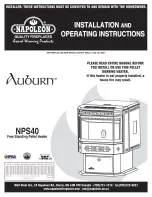
4
If you have to moor in situations where the
above-mentioned criteria exist, and the stove is
running, you must
let it go out.
Don’t leave the appliance running and
unattended.
Don’t leave the appliance running overnight.
1. Safety.
Safety issues are set out below.
2. Installation / Use – Correct Compliance.
The appliance must be installed and used in line
with our installation and user instructions.
3. Fumes – Protection From.
There are 4 main causes of fume or smoke to
leak from the appliance.
•
The chimney is blocked.
•
There are too many bends in the chimney.
The above deck chimney extension is not high
enough.
•
The chimney is not airtight.
•
The boat is moored in a position near to
high buildings, high trees or higher
surrounding land and downdraughting is
occurring.
Don’t leave the appliance running and
unattended.
Don’t leave the appliance running overnight.
Alarms
Make sure that the vessel is fitted with:-
1. Optical Smoke Alarm to BS EN14604
2. Carbon Monoxide Alarm to BS EN50291
3. Fireguard to BS8423
Checked every day for correct functioning.
Make sure that the alarms are fitted in such a
way as to be capable of waking sleeping
occupants of the vessel.
Further guidance on the fitting of alarmS refer
to BS 5839-6 AND BS EN 14604
4. Fire – Protection From.
Fire can be caused by a variety of potential danger
points and because of the space limitation on boats;
this risk is ever present and must be assessed.
Assure yourself by carrying out radiation tests.
Run the stove and check out the temperature on all
surrounding, adjacent or nearby combustible
materials and make sure that they are adequately
protected from the effects of heat radiation.
Protection can be gained by the use of -:
•
Sheet metal heat shields and spacers.
•
Heat resistant boards.
•
Fireguards.
Combustible materials can be-:
•
Wooden furniture.
•
Curtains.
•
Wooden panels or frames adjacent to the
flue pipe or where it passes through the
deck of the boat.
•
Carpet or flooring close to the appliance.
•
Items near to the appliance, which could
fall onto it and ignite, should the boat
suffer a slight impact. These could be oil or
gas lamps located near to the appliance.
5. Burns – Protection From.
During normal use many parts of this appliance
and appliance chimney can become too hot to
touch. We recommend that you provide and
secure suitable fireguards.
ALWAYS USE heatproof gloves.
The glass door panel on this appliance conforms
to the requirements of BS 1945: 1971 and
satisfies the heating appliance (Fireguards
Safety) regulations 1991 but it does get very
hot and must not be touched whilst the stove is
running.
The door-opening handle is designed to stay cool
and can be used whilst the stove is running.
5. FUELS.
1. About Wood Burning.
The first thing to learn about burning wood is that
the fuel has to be dried or seasoned and technically
this means moisture content of less than 20%. To
achieve this the wood needs to be stored for about
12 months after cutting, before burning. This is a
general guide and dependent upon the type of wood
to be used, Pine will dry out faster than Elm, and
some woods such as Willow will take forever to dry.




































